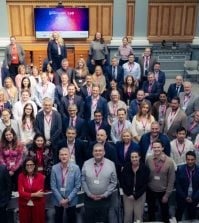Sea change: data-driven decisions in a post-pandemic world

At the Global Government Summit in Singapore, civil service leaders from 16 countries met to explore five of the biggest challenges facing their countries – debating in the second session leadership and delivery in the post-pandemic world, with data one of the focuses. Here we present some of the contributions by Mastercard’s executive vice president and the chief economist of Ireland’s finance ministry
During the pandemic, explained Mastercard’s executive vice president for strategic growth Nicola Villa, the company “could see most of the markets in which we operate in near-real time, see the behaviour of the economy, because we had access to spend data and were able to distil insights from it”.
This stream of anonymised data on financial transactions proved invaluable as governments designed and rolled out programmes to protect their populations and economies from the harms caused by COVID-19 – both supporting new services, and helping to shape policy design. In Paris, for example, retail transaction data was used to inform citizens of which shops were trading. Later, when tourists began to return as lockdowns were eased, Mastercard tracked changes in the use of its services by overseas visitors – providing local tourism businesses with the information required to shape their reopening strategies.
In total, Mastercard established about 200 initiatives with national, regional and local administrations in 55 countries. The ability to make remote payments proved particularly valuable during periods of enforced social distancing, allowing public bodies to collect and disburse funds: the company sent 350,000 prepaid cards to Israeli pensioners, for example, averting the need for them to collect their pensions in post offices. Other projects were designed to support public procurement from hard-pressed small businesses, and to combat the rising incidence of fraud and cyberattacks.
COVID-19 gave the digital agenda a hard push in many countries, commented Villa. “It is clear to us that governments emerged stronger from the pandemic in the way digitalisation took place,” he said. “We saw acceleration on the public sector as well as the private sector side.” And this was true at the micro as well as the macro level, with public servants launching services and developing projects much more quickly than previously: “Cycle times in the way partnerships are built between the public and the private sectors shrank,” said Villa – with initiatives that might have taken months or years to get off the ground in the pre-pandemic world moving from initial concept to launch in a few short weeks.
New worlds of possibility
So the fast-growing availability of real-time data on economic activity, Villa explained, much improved elected and civil service leaders’ ability to “take immediate decisions and correct actions – and we see this phenomenon surviving the pandemic”. Having demonstrated the value of its capabilities, “the private sector started to discover a stronger role for itself in the solving of some of these challenges, and we started to bring together the public and the private sectors in ways that we hadn’t imagined”.

John McCarthy, chief economist at Ireland’s Department of Finance, had himself used Mastercard data to understand COVID-19’s impacts. “During the pandemic, there was a sea change in how economists were looking at the economy; and in part, that’s due to what you guys were doing,” he commented. Data on retail sales, for example, normally takes a couple of months to arrive through the official channels, “but because of the data you were supplying, we had real-time data on the amount of spending that happened yesterday; where it happened; on what types of goods and services. We in Ireland found it really, really useful in calibrating where the economy was and the measures that were in place”.
Indeed, said McCarthy, these new streams of data raise the quality bar for national statistical institutions: if they don’t find ways to “step up and produce data more quickly”, he warned, they may find public servants relying ever more heavily on the flows of rich, real-time data available from the private sector. Now there’s a challenge.
The Global Government Summit is a private event, providing a safe space at which civil service leaders can debate the challenges they face in common. We publish these reports to share some of their thinking with our readers, this year focusing in each report on the main messages of one or two contributors. Note that, to ensure that participants feel able to speak freely at the Summit, we give all those quoted the right to anonymise or edit their comments before publication.
This is the second of five reports, covering the session on leadership and delivery in the post-pandemic world. The first focused on how to protect living standards in an era of conflict and inflation; the third looked at the lessons from COVID about public health and preparedness; the fourth at artificial intelligence; and the fifth at building public trust in government.























